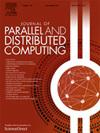MM-AutoSolver: A multimodal machine learning method for the auto-selection of iterative solvers and preconditioners
IF 3.4
3区 计算机科学
Q1 COMPUTER SCIENCE, THEORY & METHODS
引用次数: 0
Abstract
The solution of large-scale sparse linear systems of the form is an important research problem in the field of High-performance Computing (HPC). With the increasing scale of these systems and the development of both HPC software and hardware, iterative solvers along with appropriate preconditioners have become mainstream methods for efficiently solving these sparse linear systems that arise from real-world HPC applications. Among abundant combinations of iterative solvers and preconditioners, the automatic selection of the optimal one has become a vital problem for accelerating the solution of these sparse linear systems. Previous work has utilized machine learning or deep learning algorithms to tackle this problem, but fails to abstract and exploit sufficient features from sparse linear systems, thus unable to obtain satisfactory results. In this work, we propose to address the automatic selection of the optimal combination of iterative solvers and preconditioners through the powerful multimodal machine learning framework, in which features of different modalities can be fully extracted and utilized to improve the results. Based on the multimodal machine learning framework, we put forward a multimodal machine learning model called MM-AutoSolver for the auto-selection of the optimal combination for a given sparse linear system. The experimental results based on a new large-scale matrix collection showcase that the proposed MM-AutoSolver outperforms state-of-the-art methods in predictive performance and has the capability to significantly accelerate the solution of large-scale sparse linear systems in HPC applications.
MM-AutoSolver:一种多模态机器学习方法,用于自动选择迭代求解器和预处理器
Ax=b形式的大规模稀疏线性系统的求解是高性能计算(HPC)领域的一个重要研究问题。随着这些系统规模的不断扩大以及高性能计算软件和硬件的发展,迭代求解法以及适当的预调节器已经成为有效求解这些稀疏线性系统的主流方法,这些系统来自于实际的高性能计算应用。在大量的迭代解和预条件组合中,自动选择最优解已成为加速求解这些稀疏线性系统的关键问题。以前的工作利用机器学习或深度学习算法来解决这一问题,但未能从稀疏线性系统中抽象和利用足够的特征,因此无法获得令人满意的结果。在这项工作中,我们提出通过强大的多模态机器学习框架来解决迭代求解器和预处理器的最优组合的自动选择问题,在该框架中,不同模态的特征可以被充分提取并利用来改进结果。在多模态机器学习框架的基础上,提出了一种多模态机器学习模型MM-AutoSolver,用于给定稀疏线性系统的最优组合的自动选择。基于新的大规模矩阵集合的实验结果表明,所提出的MM-AutoSolver在预测性能上优于目前最先进的方法,并且能够显著加快HPC应用中大规模稀疏线性系统的求解速度。
本文章由计算机程序翻译,如有差异,请以英文原文为准。
求助全文
约1分钟内获得全文
求助全文
来源期刊

Journal of Parallel and Distributed Computing
工程技术-计算机:理论方法
CiteScore
10.30
自引率
2.60%
发文量
172
审稿时长
12 months
期刊介绍:
This international journal is directed to researchers, engineers, educators, managers, programmers, and users of computers who have particular interests in parallel processing and/or distributed computing.
The Journal of Parallel and Distributed Computing publishes original research papers and timely review articles on the theory, design, evaluation, and use of parallel and/or distributed computing systems. The journal also features special issues on these topics; again covering the full range from the design to the use of our targeted systems.
 求助内容:
求助内容: 应助结果提醒方式:
应助结果提醒方式:


